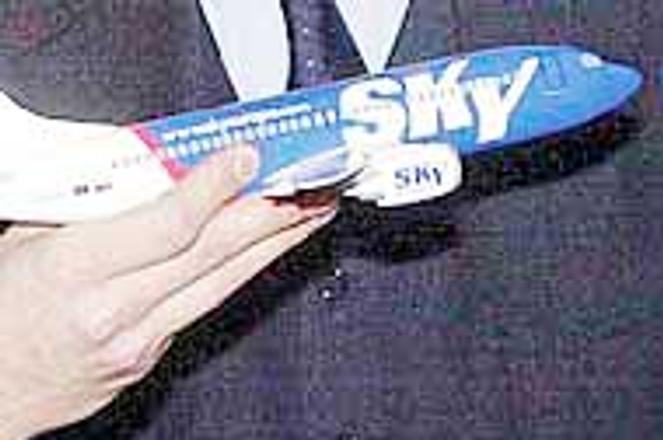Sky Europe CEO Christian Mandl (left) predicts his airline will have economic spinoffs for Slovakia.photo: TASR
"One nice thing about aviation is that from the sky you do not see the political borders; you only see the geographical features"
Sky Europe CEO Christian Mandl
BRATISLAVA'S usually sedate M.R. Štefáník airport was somewhat busier February 13 as low-cost air carrier Sky Europe opened its domestic air service to eastern Slovakia's Košice.
Sky's 30-seat Embraer 120 aircraft now make three daily flights between Slovakia's two largest cities with one-way tickets starting at Sk980 ($20) not including airport taxes; the final ticket price is currently Sk1,298.
The service is significantly cheaper than flights offered by domestic carrier Slovenské aerolínie, which after a recent price cut start at Sk2,390 one-way before taxes. First class train travel between the cities costs up to Sk750 one way, but can take over six hours compared to the 20-minute flight.
Air traffic in Slovakia has long been held back both by Bratislava's proximity to Vienna's busier Schwechat airport, and by high taxes on carriers. But the January removal of value added tax (VAT) on imports of aircraft, Sky Europe hopes, will allow the company to become a competitive low-fare European airline similar to Ryanair and Easy Jet.
Sky Europe has plans in the coming months to add routes from Bratislava to Zurich and other European hubs.
The Slovak Spectator spoke with Sky Europe CEO Christian Mandl after the firm's inaugural flight on February 13 about his feelings on the airline's development and what it will mean for Slovakia.
The Slovak Spectator [TSS]: How long has it taken you to put together Sky Europe?
Christian Mandl [CM]: We have been working on this project for about two years. Of course we are very happy today with our first flight, but I would say that most of the time during these two years was spent not on operations but on creating an environment in Slovakia that would allow us to operate in conditions similar to the European Union.
One of the largest issues was the VAT on aircraft imports, which did not allow any Slovak air carrier to be competitive with those operating out of Vienna airport.
We said that we would import our aircraft as soon as the rule changed. It was changed on January 1, and at the beginning of January we were here with the aircraft, so we keep our promises.
TSS: Have you had any other problems with the state or with the legal structure?
CM: There are still some open issues, but we have decided to show our good will to the government by starting to fly - in order to be an airline and not just a project. We are now an airline, which will allow us to continue negotiations and to show that what we are doing will be the best for Slovakia.
TSS: What impact will Sky Europe have on Slovakia and on the region?
CM: The economic impact is very clear. When you invest about one dollar in aviation, you get four dollars for the economy - in new jobs, car rentals, hotels and so on. So there is a multiplier effect, which is very important. Transport brings investors; transport brings tourism.
The response in east Slovakia to our service was extraordinary. People have the feeling that they are reconnected to the capital city, and it will be much easier for them to do business is Bratislava. You can come in the morning, go back in the evening and do your business in Bratislava. It was really great to see how happy they [in Košice] were. Of course we are a business, but we feel we are offering a kind of public service.
TSS: What does Sky Europe mean in terms of European integration? Do you see integration as a benefit for your company?
CM: One nice thing about aviation is that from the sky you do not see the political borders; you only see the geographical features. Of course, Bratislava is very close to the EU. It is an international airport. We have to see the position of Bratislava in central Europe and look at it from a competitive point of view. It only makes sense to start the business now in Bratislava if it can be competitive with Vienna.
The reason we look at it from a European point of view is that we want to be a European airline; we respect all the safety standards of the European Union. We do not want to pay more taxes than in the European Union because we are just a few kilometers away. We want to be able to have passengers from the European Union; we view Bratislava as a secondary airport to Vienna.
TSS: What cost advantages does Sky Europe have over Slovenské Aerolínie that allows it to fly the same route for less than half the price?
CM: We operate modern aircraft with lower operating costs, but I also think we have a different approach. We are not here to make a lot of money on a few passengers. We are prepared for smaller margins on many passengers.
TSS: Is there anything on the horizon that you see as a potential problem?
CM: There are always issues, but I think we have solved most of them. Today was our first flight. I was speaking to our passengers and they all seemed very satisfied. I'm just thinking that everything will go well, that our passengers will be happy, and that we will have more flights, more destinations and that this government and the next one will support this - that it is good for Slovakia and good for the economy.

